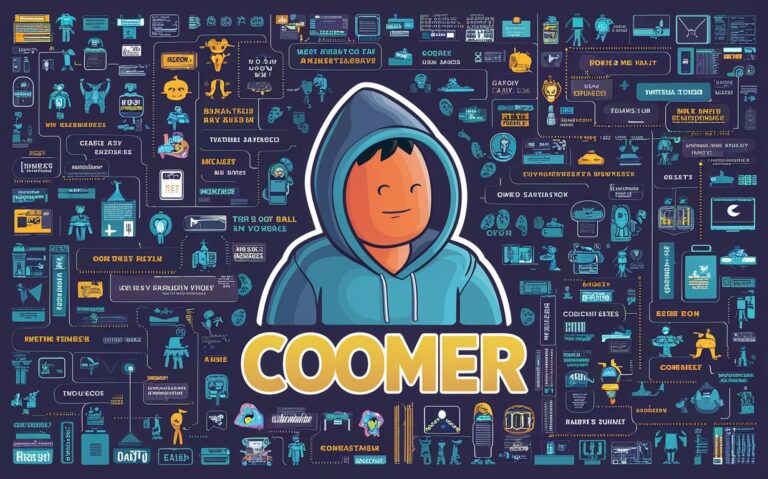Introduction
The internet is a place where slang evolves rapidly, and certain words or memes can go from obscure joke to cultural shorthand almost overnight. One such term is “Coomer,” a slang expression that has been widely shared in memes, online communities, and social media discussions. For those new to the phrase, the word may seem confusing or even out of place. Yet understanding what Coomer means is essential to navigating today’s online humor and cultural references. This article breaks down the meaning of Coomer, traces its origins in internet culture, explores how the term is used in different communities, and addresses whether it is considered offensive or simply a light-hearted meme.
The Meaning of Coomer
At its core, the term Coomer refers to a stereotype of an individual who is often portrayed as socially awkward, overly absorbed in internet use, and sometimes associated with an unhealthy focus on adult content. The word itself comes from the slang “coom,” which was popularized in meme culture as a parody of certain online behaviors. While it started as a mocking label in online forums, it has since spread across platforms like Twitter, Reddit, and TikTok. Today, being called a “Coomer” can be a playful jab among friends in some contexts, but it can also carry negative undertones depending on intent. This dual meaning is part of what makes the word both widespread and controversial.
Coomer Meme Origin
The Coomer meme gained traction in the late 2010s, when image boards and meme-driven platforms began creating exaggerated caricatures of online personalities. The original Coomer image was often drawn as a cartoonish figure with unkempt hair, baggy eyes, and slouched posture—an exaggerated visual designed to embody a stereotype rather than represent real individuals. As the meme spread, it became detached from its original niche community and entered mainstream meme culture. Much like other viral memes, the Coomer archetype is used less as a personal insult today and more as a recognizable internet shorthand for certain types of online behavior.
Coomer in Online Communities
In online communities, the term Coomer has taken on multiple layers of meaning. For some, it is simply a meme used for comedic exaggeration. For others, it represents a critique of internet overindulgence, particularly in relation to digital habits or reliance on instant gratification. Because of this versatility, Coomer has found a home across subcultures, from gaming communities to social media groups, where it is used both jokingly and critically. It is important to note that, like much internet slang, context is everything: the way the word is used in a humorous meme thread might differ significantly from how it is used in a serious conversation about digital behavior.
Is Being Called a Coomer Offensive?
The question of whether being called a Coomer is offensive depends heavily on context. In friendly circles, it might be thrown around as harmless banter, much like other slang words that exaggerate habits or tendencies. However, when used in a derogatory way, the term can reinforce stereotypes and make someone feel mocked or belittled. The offensive nature lies not in the word itself but in how it is applied. As with many internet memes, humor and harm can overlap, and the responsibility falls on users to be mindful of intent and audience when using terms like Coomer in conversation.
From Meme to Mainstream
What makes Coomer particularly interesting is its journey from niche meme to mainstream slang. It reflects how internet culture can create new words that capture the collective imagination and become shorthand for bigger ideas. Just as terms like “simp” or “based” entered everyday speech after years of circulation in meme spaces, Coomer too has made the leap into wider recognition. This shows how online communities influence language and how memes can spark cultural shifts that extend far beyond their original circles.
Conclusion
The rise of Coomer demonstrates the unique way internet slang develops and spreads. From its early roots as a cartoonish meme to its current role as a widely recognized slang term, Coomer has captured attention because it reflects both humor and criticism of online behavior. While it can sometimes be used offensively, it also functions as a cultural shorthand that people use playfully. As with any evolving slang, the key is understanding context and recognizing the nuance behind the words. In the fast-paced world of memes, Coomer is just one more example of how digital culture shapes the way we talk and connect.
❓ FAQ (Frequently Asked Questions)
Q1: What does Coomer mean?
Coomer is an internet slang term describing a stereotype of someone seen as socially awkward or excessively absorbed in online activities, often used humorously in memes.
Q2: Where did the Coomer meme originate?
The Coomer meme originated on internet forums and image boards in the late 2010s, starting as a cartoon caricature before spreading widely across social media.
Q3: Is calling someone a Coomer offensive?
It can be. In casual, humorous contexts it may be harmless, but when used with negative intent it can reinforce stereotypes and be considered insulting.
Q4: Why did the Coomer meme become so popular?
It resonated with audiences because it exaggerated behaviors associated with internet overuse, making it both funny and relatable in online communities.
Q5: Is Coomer still used in 2025?
Yes. While its peak popularity may have passed, Coomer remains in circulation as a recognizable slang term in memes, discussions, and internet humor.
